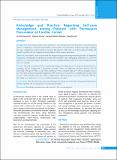Please use this identifier to cite or link to this item:
https://hdl.handle.net/20.500.14356/1114Full metadata record
| DC Field | Value | Language |
|---|---|---|
| dc.contributor.author | Rayamajhi, Nirmala | - |
| dc.contributor.author | Sharma, Kalpana | - |
| dc.contributor.author | Mahotra, Narayan Bahadur | - |
| dc.contributor.author | Aryal, Basanti | - |
| dc.date.accessioned | 2023-04-24T07:29:02Z | - |
| dc.date.available | 2023-04-24T07:29:02Z | - |
| dc.date.issued | 2021 | - |
| dc.identifier.citation | RayamajhiN., SharmaK., MahotraN. B., & AryalB. (2021). Knowledge and Practice Regarding Self-care Management among Patients with Permanent Pacemaker at Cardiac Center. Journal of Nepal Health Research Council, 19(2), 355-361. https://doi.org/10.33314/jnhrc.v19i2.3491 | en_US |
| dc.identifier.issn | Print ISSN: 1727-5482; Online ISSN: 1999-6217 | - |
| dc.identifier.uri | http://103.69.126.140:8080/handle/20.500.14356/1114 | - |
| dc.description | Original Article | en_US |
| dc.description.abstract | Abstract Background: Permanent pacemaker can be implanted as a life shaving measures for the patients with cardiovascular disease. Complications of permanent pacemaker are preventable if the patients have adequate knowledge regarding its usage, complications, and precautionary measures. The objective of this study was to find out the knowledge and practice regarding self-care management among patients with permanent pacemaker. Methods: A descriptive, cross-sectional study was adopted among patients with permanent pacemaker at Outpatient Department of Manmohan Cardiothoracic Vascular and Transplant Center, Maharajgunj, Kathmandu. A total of 98 patients were selected by using non-probability consecutive sampling technique. Data were collected using structured interview schedule. Results: The study revealed that 40.8% of patient had adequate knowledge and 32.7% of patient had good practice regarding self-care management of permanent pacemaker. There was significant association between level of knowledge with age (p=.006), sex (p=.005), ethnicity (p=.045), education status (p=<.001) and regular exercise (p=.031) after permanent pacemaker implantation (PPI). Likewise, level of practice was significantly associated with sex (p=<.001), education status (p=<.001), occupation (p=<.001) and regular exercise (p=<.001) after PPI. The knowledge score and practice score were moderately positively correlated. Conclusions: More than half of the patient had inadequate knowledge and nearly half of the patients followed poor practice regarding self-care management of permanent pacemaker. Keywords: Knowledge; permanent pacemaker; practice; self- care management | en_US |
| dc.language.iso | en | en_US |
| dc.publisher | Nepal Health Research Council | en_US |
| dc.relation.ispartofseries | Apr-June, 2021;3491 | - |
| dc.subject | Knowledge | en_US |
| dc.subject | permanent pacemaker | en_US |
| dc.subject | practice | en_US |
| dc.subject | self- care management | en_US |
| dc.title | Knowledge and Practice Regarding Self-care Management among Patients with Permanent Pacemaker at Cardiac Center | en_US |
| dc.type | Journal Article | en_US |
| local.journal.category | Original Article | - |
| Appears in Collections: | Vol. 19 No. 2 (2021): Vol 19 No 2 Issue 51 Apr-Jun 2021 | |
Files in This Item:
| File | Description | Size | Format | |
|---|---|---|---|---|
| 3491-Manuscript-23782-1-10-20210907.pdf | Fulltext Download | 293.9 kB | Adobe PDF |  View/Open |
Items in DSpace are protected by copyright, with all rights reserved, unless otherwise indicated.
